Marion Cotillard Assassin's Creed
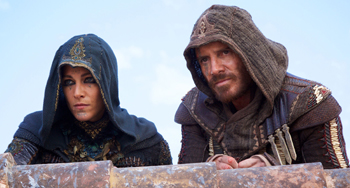
Marion Cotillard Assassin's Creed
Cast: Brendan Gleeson, Marion Cotillard, Michael Fassbender, Michael Kenneth Williams
Director: Justin Kurzel
Genre: Action, Adventure
Rated: M
Running Time: 115 minutes
Synopsis: Prepare for a visionary new take on the action-adventure genre. Assassin's Creed is a worlds-spanning tale of one man who finds himself at the center of an ancient battle between two powerful sects"only by harnessing the memories of his ancestor, which are contained within his own DNA, can he end the conflict and claim his own redemption.
Marked by tragedy at an early age, Cal Lynch (Michael Fassbender) is a convict facing capital punishment when he gains an unexpected second chance at life thanks to the mysterious workings of Abstergo Industries. Through a revolutionary technology that unlocks the genetic memories contained in his DNA, Cal is sent back across the centuries to 15th Century Spain. There, he lives out the experiences of his distant relative, Aguilar de Nerha, a member of a secret society known as the Assassins who fight to protect free will from the power-hungry Knights Templar. Transformed by the past, Cal begins to gain the knowledge and physical skills necessary to topple the oppressive Templar organisation in present day.
'We work in the dark to serve the light. We are assassins."
Assassin's Creed
Release Date: January 1st, 2017
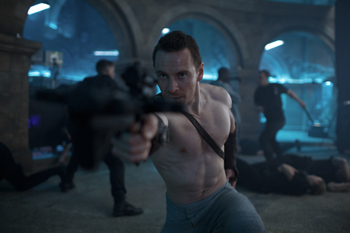 About The Production
About The Production
Adapting The Games
Released in 2007, Assassin's Creed dropped players into the heart of the Crusades, imagining a world in which the bloody, centuries-long war between the Assassins and Templars had defined much of human history. Released in 2007, the game became an instant blockbuster, spawning no fewer than eight sequels and a slew of popular spin-offs that have sold more than 100 million copies worldwide. The series has transported players to the Italian Renaissance, the foundation of America, the golden age of piracy in the Caribbean and revolutionary France.
Framing each of the games is the Assassin/Templar conflict of today, in which shadowy biotechnology company Abstergo Industries serves as the front for the Knights Templar, imprisoning Assassins and using a device called 'The Animus" to tap their genetic memories and uncover the secrets of their ancestors.
Adapting Assassin's Creed for the big screen, the movie introduces a new character to the established canon; Cal Lynch, played by Michael Fassbender. A descendent of several lines of prominent Assassins, Cal is a career criminal who is rescued from his own execution by Abstergo Industries, the modern-day incarnation of the Templar Order. He is forced to participate in the Animus Project and relive the memories of his ancestor Aguilar de Nerha, an Assassin during the Spanish Inquisition. As Lynch continues to experience Aguilar's memories, he begins to gain an understanding of his traumatic past and his role in the centuries-long conflict between the warring factions.
Michael Fassbender, who has fast emerged as one of the world's most accomplished and popular actors, immediately saw the potential in a new adaptation of the game. 'The Assassin's Creed universe seemed to lend itself very nicely to a cinematic experience," he says of the project. His faith in the material was such that his company DMC boarded the project as producers. They were joined by Frank Marshall and Patrick Crowley, who together have been responsible for the Bourne series of films and, most recently, Jurassic World.
'Assassin's Creed is a mammoth game in terms of its penetration all over the world," says producer Pat Crowley. 'There's a whole world of people who know all of the rules and all of the by-laws and the history and all of the various characters that make up the Assassin's Creed gaming experience."
But, he says, the new movie, written by Bill Collage, Adam Cooper and Michael Lesslie, isn't just for long-time fans familiar with the series' rich mythology"it offers a thrilling standalone experience for newcomers as well. 'The story we've come up with is a story in which you don't ever have to have played the game in order to really enjoy the movie."
With his experience portraying the powerful mutant Magento in films including X-Men: Days of Future Past, Michael Fassbender uniquely understood the storytelling possibilities afforded by the game's time-bending, sci-fi inflected premise, and he was excited by the opportunity to amplify the already expansive world of the Assassin's Creed for the big screen. 'When I met up with the guys from Ubisoft, and they started to explain this whole world and the idea of DNA memory, it struck me as a very feasible scientific theory," Michael Fassbender says. 'I thought about the possibility of it being this cinematic experience. We're approaching it as a feature film as opposed to a videogame."
To that end, original characters"including the dual roles of Cal and Aguilar played by Michael Fassbender "were created expressly for the film. Says the actor of Cal =: 'He doesn't have a lineage he can feel he belongs to. He's a bit of a lost soul. He's always been drifting in and out of correctional facilities." Conversely, Aguilar is 'very much somebody that belongs to the Creed. He has a cause. He's been following that cause. He belongs to it."
With Michael Fassbender on board, attention turned to a director who could partner with the star and bring additional depth to the storytelling. Having collaborated with both Michael Fassbender and Marion Cotillard on 2015's Macbeth, Justin Kurzel was a natural fit. Michael Fassbender had first met the Australian filmmaker after he saw the director's debut feature, the dark indie drama Snowtown: 'I immediately felt that I wanted to work with this guy," notes Michael Fassbender. 'Just from the feel of who he was as a person and the conversations we were having, I knew we could collaborate. We were lucky that he responded to the material. To have someone of his strength and vision was a huge bonus."
'The great thing about Justin Kurzel is that he can make the complicated elements and difficult subject matter manageable and relatable for an audience, which is what he did with Macbeth," Michael Fassbender continues. 'So to have that perspective and bring it into a fantasy world, we knew that was going to be a huge bonus to us."
Adds producer Frank Marshall: 'Justin Kurzel is somebody who came in and knocked our socks off. He came in with an exciting approach of how to tell the story and how he would look at it in a very real way. He wanted to approach the world in a very realistic sense, not a super-human or fantasy sense, and we all liked that."
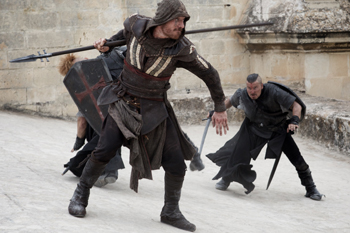 Cal's journey was at the heart of Justin Kurzel's interest in the project. Through learning the truth of his ancestors, Cal gains perspective on his troubled past and begins to move toward a place where he truly understands and embraces his role in the world. Exploring fundamental questions such as how history can shape identity were paramount for the filmmaker"and he was fascinated by the notion of genetic memory, that our own actions and the choices we make can echo across generations.
Cal's journey was at the heart of Justin Kurzel's interest in the project. Through learning the truth of his ancestors, Cal gains perspective on his troubled past and begins to move toward a place where he truly understands and embraces his role in the world. Exploring fundamental questions such as how history can shape identity were paramount for the filmmaker"and he was fascinated by the notion of genetic memory, that our own actions and the choices we make can echo across generations. 'It's about a man who learns who he is through the experiences and lives of those who have come before him," Justin Kurzel says. 'That always intrigued me. If you are naïve to what your bloodline is, how do you make sense of certain emotions that you might feel that are actually inspired by your DNA? That is an integral and dynamic part of the concept of Assassin's Creed that I think elevates it from just being a game."
Nevertheless, the filmmaker says the story was a complicated one to get right. 'The challenging thing about Assassin's Creed is that the concept is really complex," Justin Kurzel says. 'The idea of a modern-day character who goes into this machine called the Animus and that takes him back? It's not a time travel machine"it's a memory travel machine. On top of that there is the war between the Templars and Assassins, and understanding that it is centuries long. Ultimately, you want to leave the audience with a central idea of what the film is about. That was the most challenging element"how do you take two different, complex genres, and two different time periods, and one actor that is playing two different characters and leave the audience with something satisfying?"
Fortunately, Michael Fassbender says the director's vision and steady hand guided the production toward the light. 'Justin Kurzel's insight into the piece, and the clearness of what we were looking for in each scene, really brought a clarity to each beat," he says.
Historical Context
One of the greatest successes of the Assassin's Creed franchise has been its clever marriage of real history with its heightened fantasy. The Assassins and the Knights Templar are both real groups whose philosophies were in diametric opposition, and whose embrace of secrecy led to much speculation about their motives.
The Assassins are drawn from Hashashins of Nizari Islam, characterized as a secret order that followed a figure known as the Old Man on the Mountain. Over the course of 300 years, the Assassins killed hundreds of important targets, and in fact the word 'assassin" originates from this group. The Crusaders, who form the backdrop to the first Assassin's Creed game, found the clan particularly fearsome, and their legend was further embellished in Crusades stories told by Marco Polo.
The Knights Templar, by contrast, was a Christian order established for nearly two centuries during the Middle Ages. Officially sanctioned by the Roman Catholic Church, Templar membership included some of the most important and feared figures of the age, and the group held enormous power and influence until its dissolution in 1312. Its sudden disbanding at the height of its power led to a belief that the organization had simply gone underground, where it continued to exert its influence.
Assassin's Creed imagines a world in which neither one of these groups fully disappeared, instead waging a silent, centuries-long war with one another and deciding the course of real human history through their actions. Many historical figures factor into the games, and the movie is no different, revealing Tomas de Torquemada, for example, as a Templar enforcer that the Assassins must stop, during the most brutal days of the Spanish Inquisition.
Says Pat Crowley: 'In the world of Assassin's Creed, the Assassins are characters who live by stealth, as opposed to the typical warrior of the time who would have a big sword, who would have shields, who would ride horses. The Assassins have hidden blades attached to their wrists with leather armbands, and they use these weapons in order to be able to kill at close range."
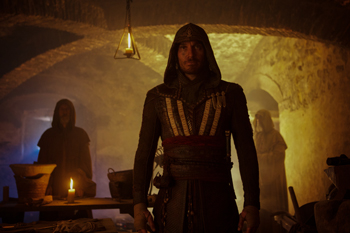 The Assassins live by several key tenets but one is paramount: that they work in the darkness to serve the light. 'One of their credos is that you hide in plain sight," Pat Crowley continues. 'So they're very good at camouflaging themselves. They're very good at blending in, and then they create enormous social disorder, because no one is expecting that they're there."
The Assassins live by several key tenets but one is paramount: that they work in the darkness to serve the light. 'One of their credos is that you hide in plain sight," Pat Crowley continues. 'So they're very good at camouflaging themselves. They're very good at blending in, and then they create enormous social disorder, because no one is expecting that they're there." The Assassins are interested in protecting free will, while the Knights Templar are interested only in power and subjugation of free peoples. 'The Templars want to effectively control everything, make life very predictable and eliminate chance and opportunity," Pat Crowley says. 'It's a much more totalitarian approach."
The meticulous attention to historical detail that helped Assassin's Creed become such a landmark in the gaming world also helped inform the new film, Pat Crowley says"using historic fact as a guidepost even delivered a stunning set piece, according to the producer. 'It forced us to do this great job in terms of costumes, in terms of weapons, in terms of fighting styles," he says. 'One of the most exciting things that we did for the movie historically is we recreated an auto-da-fe where, during the Spanish Inquisition, they would routinely take and burn people at the stake, as a way of essentially demonstrating their control, to rid themselves of what they perceived as heretics. It took enormous research and painstaking work for all of our departments to present this accurately."
It was through researching both 15th Century Spain and the game itself that Justin Kurzel found the world of the film. 'I didn't know much about the game," he says. 'But I was quite blown away by the level of detail, effort and passion of the game. It has a historical integrity"it didn't feel like entertainment fodder. It felt strongly that there was a narrative and a vision, a voice, and a culture. That was a real eye opener. We took ideas, and started developing them, just as if you were adapting a book"what is the most interesting thing here, and what are our characters and what is their journey?"
The director sought to ground the film to the greatest extent possible to make the story credible and vibrant"it was that desire, in part, that led to the decision to subtitle the historic sequences set during the Inquisition with the actors speaking in Spanish. 'We were very determined to make an audience believe that this world and these characters exist," adds Justin Kurzel. 'I wanted it to be an unbelievable ride and an immersive experience that combines these exotic worlds with some dynamic action sequences."
Casting Assassin's Creed
Together, Michael Fassbender and Justin Kurzel tapped a familiar collaborator to round out the lead cast: Marion Cotillard, who starred as Lady Macbeth alongside Michael Fassbender in Justin Kurzel's Macbeth. Says Michael Fassbender: 'When Justin Kurzel came on board, then Marion became interested, and it was a massive bonus for us to have an actor of her worth, credibility, sensitivity and intelligence."
Marion Cotillard plays Sofia Rikkin, the scientist at the Abstergo facility who introduces Cal to the Animus project. The goal of her research is to find a cure for violence"or so she believes. 'She thinks she's working for a noble cause," Marion Cotillard says of her character. 'She's very passionate about her cause, but she has a humanity in her that is interesting. Abstergo means purified in Latin. And Sofia is trying to improve the human race and discover what ignites violence in a human being. She is genuinely trying to find the cure. She's fascinated by human beings as well as science. She truly believes that she's going to help human beings."
Marion Cotillard found the opportunity to reteam with Justin Kurzel and Michael Fassbender irresistible. 'Confidence is one of the most important things that I look for in a director," she says. 'I suspected that I would trust Justin Kurzel entirely when I first spoke to him on the phone before we did Macbeth. And I knew that Michael Fassbender was an amazing and committed actor. The experience that we had on Macbeth was very intense and really created a very special relationship. Arriving on a set where you know you can trust a hundred per cent your partner and your director is something that is very strong. And going to work together again on another project, and a totally different project, was very exciting."
Having worked so closely together on Macbeth, the actors and director had developed a short hand that allowed them to collaborate more efficiently. 'We had to shoot Macbeth in a short period of time"the weather was intense, the material was intense," Michael Fassbender says. 'We became very close very quickly and we had to work very quickly, so having shared that experience absolutely helped. We understood each other and we could just get on with the work."
'Sometimes you meet someone and you feel like you've known them your whole life," Marion Cotillard says of Michael Fassbender. 'That's the feeling I had with Michael. He's creative and inventive, but his power of invention never gets in the way of simplicity. He surprised me every day."
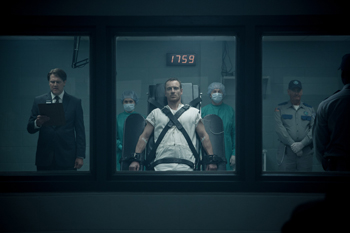 With the principal actors in place, attention turned to the figures surrounding Cal as he undertakes his life-altering adventure. Jeremy Irons (Reversal of Fortune) plays Rikkin, Sofia's father and the visionary CEO of Abstergo Industries. The head of an organization dedicated to the 'perfection" of humankind, Rikkin's motives are more complicated than they outwardly appear, and his ties to the modern-day Templar movement cast him in a suspicious light.
With the principal actors in place, attention turned to the figures surrounding Cal as he undertakes his life-altering adventure. Jeremy Irons (Reversal of Fortune) plays Rikkin, Sofia's father and the visionary CEO of Abstergo Industries. The head of an organization dedicated to the 'perfection" of humankind, Rikkin's motives are more complicated than they outwardly appear, and his ties to the modern-day Templar movement cast him in a suspicious light. 'I've always enjoyed playing people who are amoral or who swim against the tide," notes Jeremy Irons of his attraction to the role. 'And while I'd never played Assassin's Creed, I thought the movie had an interesting pedigree, and Justin Kurzel is a very interesting director. I was looking forward to working with Michael Fassbender and Marion Cotillard, two actors who I really admire. There's something about Michael's energy that comes over on screen"I don't know where it comes from. And Marion Cotillard is a superb actress really captured the very complicated and delicate relationship between Sofia and her father."
With Abstergo the front corporation for the modern-day Templar movement, Rikkin's aims for the work being done at the facility are very different from what Sofia imagines. 'The relationship Sofia has with her father is very complex," Marion Cotillard says. 'They're like strangers to each other, and they must have lived separately for a long time. Sofia is totally dedicated to her research, and at the same time she really wants the recognition of her father and sometimes she just doesn't know which is more important."
Cal, too, has a particularly complicated relationship with his father, notes Irish actor Brendan Gleeson, who plays Joseph Lynch. 'Cal's memory of his father is not pleasant," he says. 'His final memory of him is not pleasant at all. They have a different version of past events and Cal is hell-bent on killing him."
It's not the first time Brendan Gleeson and Michael Fassbender have appeared as father and son on screen"earlier this year, the actors starred as part of a criminal clan in the acclaimed indie heist drama Trespass Against Us, which premiered at the Toronto International Film Festival. 'It's difficult to know what you're going to get from him exactly because he's so individual and very instinctive," Brendan Gleeson says. 'I've found it really interesting working with him because there's a kind of a life-force at play that is totally, totally different to anything else and to anybody else I've worked with. And Justin Kurzel is the real deal, and it's a fantastic pairing with Michael Fassbender."
Of the film's subject matter, Brendan Gleeson adds: 'It seems to be very current and very applicable to the world that we live in. It's all about power and tribes and beliefs and faith, and all those things that drive men into places of intense darkness."
Another resident at Abstergo, Moussa, played by Michael K Williams, is a descendant of Baptiste, a Haitian Assassin who uses voodoo poison against his enemies. 'Moussa definitely has some Assassin skills, although I think he prefers to use trickery and magic and voodoo to slay his opponents as opposed to just hand-to-hand combat," Michael Williams says. 'But if it needed to be he could take it to the man."
Ariane Labed portrays Maria, an Assassin and a key ally of Aguilar. 'Ariane Labed was an actress that I really loved from films I'd seen her in," Justin Kurzel says. 'She is such an interesting and beautiful looking person, and there is something that is mysterious about her. She was a dancer in the past, so I knew that she would find the physicality of the character much more comfortably than other actors."
Also starring are Matias Varela as Emir, a descendant of Yusuf, a Middle Eastern Assassin who uses a bow and arrow, along with a sword and knives, against his enemies, and Denis Menochet, who plays McGowan, head of Abstergo security.
Finally, iconic Academy Award-nominated actress Charlotte Rampling appears as Ellen Kaye, one of the highest-ranking elders of the Templar society, a woman whose sole aim is to create a society of order and control. The authenticity she brings to the performance was key to grounding the mythology of the Templar society into something truly believable and completely menacing.
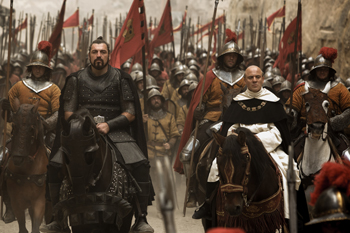 Says Justin Kurzel: 'As with all my casts, I chose actors that I love."
Says Justin Kurzel: 'As with all my casts, I chose actors that I love." The Action Of Assassin's Creed
As one of the video gaming industry's most popular and beloved franchises, Assassin's Creed is famous for its heart-pounding action sequences. The series was among the first to prominently feature Parkour as a major gameplay element, with Assassins breathlessly vaulting over the rooftops of cities including Jerusalem, Florence, Paris and London.
For his big-screen adaptation, Justin Kurzel sought to amplify that dizzying style with thundering carriage chases, elaborate sword fights, and close hand-to-hand combat. The director also realized the film had to prominently feature the Leap of Faith, a signature Assassin's Creed move in which Assassins leap from the edge of buildings and plummet gracefully to the ground below, landing on their backs in water or bales of hay. 'What happens if you do a real Leap of Faith?" Justin Kurzel asked. 'What would happen if you actually saw Assassins jump from building to building? The great thing about cinema is that you can bring that human element into it, where the audience responds and reacts to the idea that they are watching real human beings actually put the effort and danger in doing those things."
Justin Kurzel and his team tapped some of the top Parkour talents to determine how to stage the action of Assassin's Creed without relying on extensive CG trickery. The production then travelled to some of the most visually stunning corners of the globe in the hopes of capturing one-of-a-kind sequences that would offer viewers an immersive"and realistic"experience.
'I never wanted the film to feel like superheroes," Justin Kurzel says. 'I wanted you to look at it and think, Wow, there are human beings doing that and they are doing it like Olympians, as opposed to filming on a parking lot with green screen. You can feel that artifice. That is probably why we went toward a more old-school approach, to make the whole film feel more human and more intimate."
Filming began in late August 2015 and continued through January 2016. The film was shot over 90 days on location in Malta and Spain and on the 007 Stage at Pinewood Studios. 'In an era where there is a lot of CGI we wanted to have as much old-school location filming as possible," Michael Fassbender says. 'We wanted to have that feeling that you can almost taste the sweat and the blood and the real effort that went into the physical pieces of the film."
Justin Kurzel turned to award-winning stunt coordinator Ben Cooke (Skyfall) to design a fighting style for the Assassins that was faithful to the game but cinematic enough to wow moviegoers. Authenticity was always the watchword, Ben Cooke says: 'I've got some of the best Parkour experts that the world has to offer, and the stunt team are really trying to take these physical abilities that people really have and use them without having to go crazy with enhancement or wires so on the screen you see people doing real stunts."
The peril was real, too: the production shot on the roof of a 500 year-old church in Valletta, the capital city of Malta, in some cases connecting stunt wires to centuries-old mortar and hoping it would hold. 'Having a sense of danger about it, that sense of realism, it breathes oxygen into the film," Justin Kurzel says. 'The effort in shooting a lot of for real makes the cinematic experience a lot more immersive."
Never one to shy away from an acting challenge, star Michael Fassbender performed many of his own stunts. 'He worked out enormously," Justin Kurzel says. 'He did a lot of training. He worked the Parkour. He did a lot of the fight sequences. I think that is something that was attractive to him about doing the film"the idea of being heavily involved in the physicality of his character in the past."
'I trained every morning before work, conditioning and strengthening," Michael Fassbender says. 'And then some Parkour training, which is huge in the game, so it was very important for us to get it right. In terms of Aguilar's fighting technique, his weapon of choice are the blades on the wrist as it's a lot of close-quarter fighting and a lot of slashing and punching movements. We didn't want things to be too beautiful-looking. We wanted there to be an element of messiness and nastiness there. So, at moments, it's very beautiful and stylised, and then in other moments, it's very visceral, nasty and messy, and more thinking on your toes and improvisational."
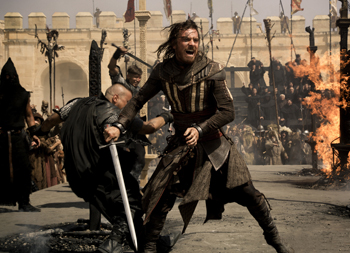 Shooting The Leap Of Faith… For Real
Shooting The Leap Of Faith… For Real Director Justin Kurzel and his team knew committing to real action meant embracing perhaps the biggest challenge stunt work can muster: the free fall. Endless calculations, safety assessments and risk mitigation go into choreographing every stunt in every film, but the free fall is among the most dangerous stunt to attempt because it carries with it an element of unpredictability. Indeed, in the era of CGI, it is very rare for large free falls to be shot practically, and even when they are shot practically, they're often not true free falls but rather controlled descents on wires.
And yet, the free fall is central to the Leap of Faith, Assassin's Creed's signature move. The production understood that, if this stunt were to be omitted from the movie"or faked in a computer"the action would fall flat. So, rather than using a digital double, the production tapped renowned free runner, stuntman and gymnast Damien Walters who rose to the challenge of orchestrating a 125-foot free fall.
As luck would have it, Damien Walters was already a fan of the Assassin's Creed games, and before boarding the project, the Brit, who had performed stunts in films including Kingsman: The Secret Service and Skyfall, had begun to contemplate performing a Leap of Faith for his popular YouTube channel. Notes Michael Fassbender with amazement: 'Damien Walters did a 125-foot Leap of Faith for real off a crane without any wires, without any bungee cord, just a free fall."
The Leap was filmed in the desert in Almería, Spain. Says Justin Kurzel: 'The light made it such a spiritual place. Sergio Leone had filmed his Westerns in that area, and it felt like the right place to do the Leap of Faith." In fact, Walters made eight Leaps of Faith"starting at a height of 40 feet and progressively going up to 125 feet, which had never been done before. 'On camera, 80 feet to 125 feet sort of looks the same, but there was something really important in him in wanting to achieve the highest drop he has ever done," Justin Kurzel says. 'It was quite an exciting day and quite nerve-wracking as well. But I think you can feel that in the shot"you can feel someone has actually done it. And I love that I can actually say that, and we have captured that in camera. It wasn't through the safety of someone pushing some buttons."
Even for a seasoned stunt performer like Damien Walters, the free fall was frightening to contemplate, and despite the fact that the production was running a second unit to capture the stunt on set that day, the main unit still paused to watch Damien Walters pull it off. Laughs Damien Walters: 'The actual footprint of the base is only 10 meters X 10 meters, so when you're up on the platform at 125-foot, the base looks about the size of an A4 piece of paper. The best bit is when you walk off afterwards and say to yourself, -Yeah, I'm alright.'"
The Look Of Assassin's Creed
The biggest challenge of the production was recreating the world of 15th Century Spain that forms the backdrops for Cal's regressions into Aguilar's memories. Location shoots in Malta and Almería, Spain, bookended the production schedule, with filming taking place between at Pinewood studios. But there was a unifying element tying together past and present, Justin Kurzel says. 'Light is a huge motif in Assassin's Creed, that very heavily inspires and influences the visuals," the filmmaker says, pointing to the paintings of Caravaggio as a particularly strong source of inspiration.
'The line, -We work in the darkness to serve the light,' the idea of characters working in stealth being able to quickly disappear into darkness, influenced the look," Justin Kurzel says. 'It has a slight film noir quality, and I was inspired by old Sergio Leone Westerns with big wide-angle lenses, and Lawrence of Arabia, which was shot with real light, in the camera, and at a particular time of day. We used a lot of smoke, dust and atmosphere to make the environments feel alive and grounded and also embraced the natural environments at our locations."
Malta was chosen for its historical verisimilitude, as well as its talented local crews and production infrastructure. 'We went to Malta for four weeks of filming and built some very big sets there," Pat Crowley says. 'We used existing fortresses"Malta has more fortresses than any place I've ever been in"and some of their downtown areas, which are period authentic for what it is that we were interested in. It's a UNESCO world heritage site, so you get some fantastic production value."
Although Malta had the right architecture and the space on which to build enormous sets, it didn't have the wide-open vistas the production also required for epic carriage battles and larger set pieces. For that, they travelled to southern Spain. 'We filmed near the town of Almería where all the spaghetti Westerns were done," Pat Crowley explains. 'We were going for that landscape because Justin just fell in love with that landscape."
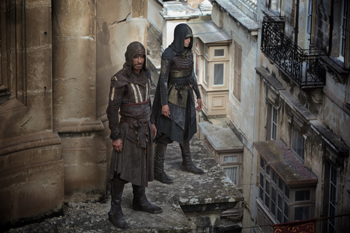 For the present day sequences, production designer Andy Nicholson constructed the Abstergo facility from the ground up on Pinewood's fabled 007 Stage, Europe's largest soundstage. The facility was conceived as a sleek modern structure built around the ruins of an old chapel"the chamber that would house the Animus"and Nicholson's team put the sets together as they would actually appear to allow Justin Kurzel and crew the greatest number of options for the six-week shoot.
For the present day sequences, production designer Andy Nicholson constructed the Abstergo facility from the ground up on Pinewood's fabled 007 Stage, Europe's largest soundstage. The facility was conceived as a sleek modern structure built around the ruins of an old chapel"the chamber that would house the Animus"and Nicholson's team put the sets together as they would actually appear to allow Justin Kurzel and crew the greatest number of options for the six-week shoot. The Animus set was constructed off-site, however, owing to the complexity of the scenes that were to be shot on there. Additionally, the Animus, the actual machine used to experience ancestors' memories, was redesigned for the film from a chair to a machine that lifts the user in the air, to allow for a more modern, interactive and dramatic experience.
There's a very deliberate contrast to the worlds Cal and Aguilar inhabit, Justin Kurzel says.
'The past is much more archaic," he says. 'It's hotter and warmer and sweatier. It's got grit and texture. It's gold and rich and red, whereas Abstergo is much more architectural. It is colder. The textures are cement. There is definitely this classical feel about it. It was all about linear, controlled line work, very classical architecture, a sense of order and shape to it, but sophisticated, as if a modern day architect has been commissioned to design Abstergo. It has a much tighter feel than the looseness of the Assassins in the world of the past. 'The past is 15th Century Spain, and it's really the spirit of the Assassins. It is much more unbound and organic and richer in colour and design."
That aesthetic extended to the wardrobe created by costume designer Sammy Sheldon Differ. Justin Kurzel briefed her to ground even the familiar Assassins cloaks in the real world and true history. 'We wanted the Assassins to represent free will, almost like gypsies and travellers, inspired by different cultures and have different trinkets on them," Justin Kurzel says. 'We were very interested in Moorish and Arabic influences, so their costumes became much more of a collection of influences. I wanted the material to feel worn. I didn't want it to feel contrived in the sense that there were no markings on them, and that they felt new. I was really excited that they had personality and character. I wasn't so hung up on the costume feeling beautiful. I liked the fact that at times it could feel wet, as if it has had a history of its own."
Sammy Sheldon started with 15th Century Spain, creating the silhouettes that would define the Assassins and carry through into the modern Abstergo period. 'We used some of the lines in the game throughout," she notes, 'including the eagle shape, which is very significant in the games. Certain ways we've cut things and then repeated that in the modern world establishes a subtle continuity."
Michael Fassbender praised Sammy Sheldon's designs as integral to his fully inhabiting the character of Aguilar. 'As soon as you put on the costume you really feel like the character," he says. 'I'd worked with our costume designer Sammy Sheldon before on X-Men, and she's just got a very original and fun and inventive way about her. She did a wonderful job on the costumes. She referenced a lot of what was happening in the game, but a lot of those costumes in the game wouldn't have translated that well to a film or a living person running around in it. And so she took elements of that and then used her own inspiration, her own fantastic creative mind and came up with these beautiful costumes with really intricate detail. They also needed to be very comfortable to run and jump in so she did a great job in making the costumes look really good, but also very practical."
For Sammy Sheldon, getting the familiar Assassin hood right was a substantial challenge that required a lot of experimentation. Sammy Sheldon designed many different iterations of the hood so that the fabric would drape correctly over an actor's head as he or she moved on set. It took 20 or 30 attempts to capture the correct silhouette.
Says Justin Kurzel: 'The coolest part of the whole costume is the hood. It's an iconic image. Walking down the street today if you see people with hoods on, there is something really attractive and interesting and beguiling about them. It is definitely an element that we understand is a great thing."
For the Templars, Sammy Sheldon reached back to history for inspiration, but she made strategic tweaks to the traditional look to create something wholly unique for the film. 'There is definitely a thread from the Templar world," she says, 'but we've gone on our own route with the slightly more tribal feel and tried to make them their own thing within the 15th Century so it's not the familiar big red cross and the tabard. I wanted them to look much more aggressive and much more realistic and not be encumbered by all that fabric and what everybody knows of the Crusades."
In the end, Sammy Sheldon's team created more than 1,000 costumes for the principal actors, supporting characters and background artists. Ten Aguilar costumes were made in total over the course of four months. 'Five are used by Michael Fassbender and four are used by stunt doubles," she explains. 'A tenth costume is just a backup plan. They deteriorate quickly, which is a good thing as they look worn-in. There are -hero' versions, one for wirework, one for Parkour, one for stunt work and one for fighting. You have all these different versions depending on the action."
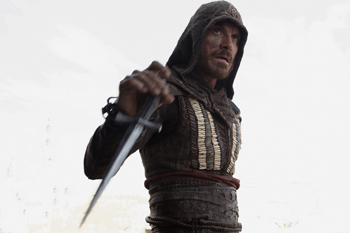 Throughout the process, Ubisoft remained a committed partner, opening their archives to the production to ensure that the film earns its proper place in the series' canon. 'One of the great things has been how excited and involved the people who made the game have been," Marshall says. 'They've wanted to help, and they're excited to see how the movie's coming together. It's a different kind of challenge for them, but being able to work with us to incorporate the elements that made the game so great has been really terrific. They're collaborators and we're collaborating all the time on how to keep the game world and the movie world together."
Throughout the process, Ubisoft remained a committed partner, opening their archives to the production to ensure that the film earns its proper place in the series' canon. 'One of the great things has been how excited and involved the people who made the game have been," Marshall says. 'They've wanted to help, and they're excited to see how the movie's coming together. It's a different kind of challenge for them, but being able to work with us to incorporate the elements that made the game so great has been really terrific. They're collaborators and we're collaborating all the time on how to keep the game world and the movie world together." Marshall sees the future of Assassin's Creed on the big screen as being as lasting as that of the games on which it is based. 'One of the things we're very aware of is that we have to set up the story and give it a place to go," he says. 'And I think the characters that are in the story that we're establishing are so engaging and so interesting that you're going to want to see them go on. With all the history that we have, there are a lot of different places they can go."
Assassin's Creed
Release Date: January 1st, 2017
MORE
- Mission: Impossible Fallout
- Glenn Close The Wife
- Allison Chhorn Stanley's Mouth Interview
- Benicio Del Toro Sicario: Day of the Soldado
- Dame Judi Dench Tea With The Dames
- Sandra Bullock Ocean's 8
- Chris Pratt Jurassic World: Fallen Kingdom
- Claudia Sangiorgi Dalimore and Michelle Grace...
- Rachel McAdams Disobedience Interview
- Sebastián Lelio and Alessandro Nivola...
- Perri Cummings Trench Interview



